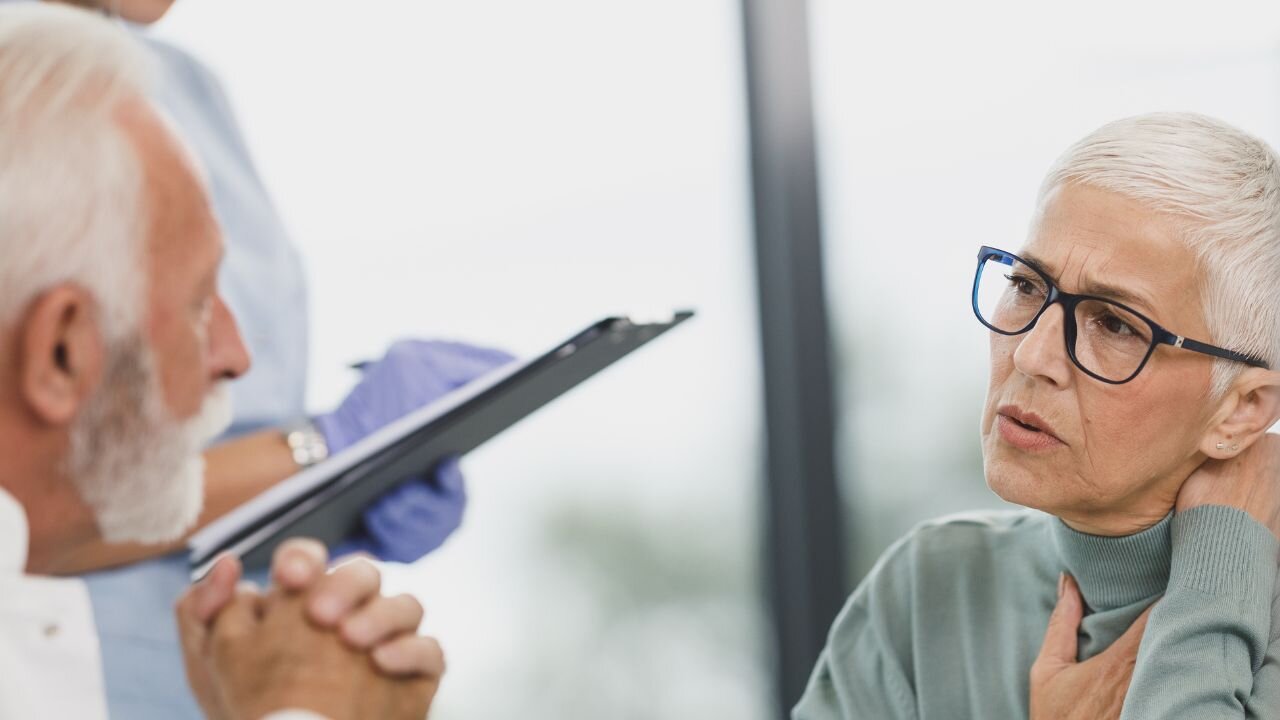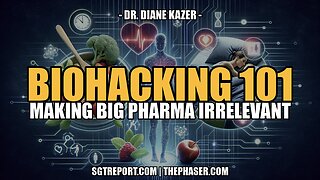Premium Only Content

Are Americans ignoring symptoms that could be serious?
Six in 10 Americans admit they ignore symptoms that don’t feel “serious,” according to new research.
A survey of 2,000 adults evenly split by generation and gender found that more than half of women said they’re likely to ignore those symptoms (58%).
The survey explored the knowledge gap in understanding when symptoms that feel “mild” should be taken more seriously.
Results found that of those who ignore minor symptoms like rashes, sleep issues or digestive issues, 43% said it’s because they assume they’re not serious.
Men are more likely to ignore minor symptoms because they believe they can push through them (46% vs. 38%), while 44% of women say they don’t act on these symptoms because they don’t want to overreact.
Conducted by Talker Research for MD Live, the survey found that while the average person experiences pains and aches four times a week, women are more likely to experience them daily (23%).
Surprisingly, boomer women are the most likely to brush off these minor aches and pains than other generations (68%).
“Women’s health concerns have often been minimized or misinterpreted, leading many to second-guess their own symptoms,” explains Dr. Maggie Williams, medical director for Primary Care at MD Live by Evernorth. “This is particularly common among older women, who may assume symptoms are just part of getting older. However, conditions don’t always present the same way in women, and when these differences go unrecognized, critical warning signs can be missed.”
Two-thirds of those surveyed say they’re confident in their ability to identify what illnesses affect them based on their symptoms, with 65% of women feeling secure in their ability to do so.
However, the survey also revealed that there are significant knowledge gaps when it comes to how certain health conditions, like cardiovascular disease or mental health issues, can present differently in men and women.
The survey found that a majority aren’t aware that conditions like depression (61%), anxiety disorders (61%) and strokes (74%) don’t appear the same across genders.
Women were particularly unaware that their symptoms may look different for digestive disorders (70%), stroke (68%) and thyroid conditions (60%).
When it comes to depression, 47% didn’t acknowledge that women tend to experience sleep issues and another 38% didn’t name sadness as one of the symptoms for women, despite it being one of the telling signs.
When asked about acute cardiovascular complications, like stroke or heart attack, the majority of women missed symptoms that are common for their gender, including shortness of breath (53%), nausea/vomiting (80%), jaw pain (76%) and fainting (76%).
The survey also revealed that how and when people decide to act on their symptoms may be influenced by past experiences — especially for women.
Women were more likely to agree that their gender has to wait longer for an accurate diagnosis (46% vs. 38%), and nearly half (47%) say cultural stereotypes about women have influenced the perception of how serious their symptoms are.
One-third of women have hesitated to seek further care because they were told their symptoms were “normal” for their gender.
For one in three women who have experienced a delayed diagnosis or misdiagnosis before, they admit their lack of symptom awareness contributed to that delay.
In fact, one in eight older respondents admit that aging hasn’t improved their ability to recognize signs of common illnesses they might have missed when they were younger.
While the access to health information online (74%) and on social media (56%) have made respondents feel more educated, two-thirds of people admit they come across health information every month that contradicts something they thought they knew, including 66% of women.
Moreover, one in five women say health information on social media has made them feel more confused about their health.
As a result, nearly a third of Americans have a hard time trusting health information they get from others who are not healthcare professionals (31%).
“Misinformation and conflicting advice can make it difficult for people to trust what they’re experiencing,” notes Dr. Williams. “While online resources can provide general guidance, there’s no substitute for speaking with a trusted, board-certified doctor who can assess symptoms in the right context and ensure they aren’t overlooked or dismissed.”
Survey methodology:
Talker Research surveyed 2,000 Americans evenly split by generation and gender; the survey was commissioned by MD Live and administered and conducted online by Talker Research between Feb. 19 to Feb. 26, 2025.
We are sourcing from a non-probability frame and the two main sources we use are:
● Traditional online access panels — where respondents opt-in to take part in online market research for an incentive
● Programmatic — where respondents are online and are given the option to take part in a survey to receive a virtual incentive usually related to the online activity they are engaging in
Those who did not fit the specified sample were terminated from the survey. As the survey is fielded, dynamic online sampling is used, adjusting targeting to achieve the quotas specified as part of the sampling plan.
Regardless of which sources a respondent came from, they were directed to an Online Survey, where the survey was conducted in English; a link to the questionnaire can be shared upon request. Respondents were awarded points for completing the survey. These points have a small cash-equivalent monetary value.
Cells are only reported on for analysis if they have a minimum of 80 respondents, and statistical significance is calculated at the 95% level. Data is not weighted, but quotas and other parameters are put in place to reach the desired sample.
Interviews are excluded from the final analysis if they failed quality-checking measures. This includes:
● Speeders: Respondents who complete the survey in a time that is quicker than one-third of the median length of interview are disqualified as speeders
● Open ends: All verbatim responses (full open-ended questions as well as other please specify options) are checked for inappropriate or irrelevant text
● Bots: Captcha is enabled on surveys, which allows the research team to identify and disqualify bots
● Duplicates: Survey software has “deduping” based on digital fingerprinting, which ensures nobody is allowed to take the survey more than once
It is worth noting that this survey was only available to individuals with internet access, and the results may not be generalizable to those without internet access.
-
 0:53
0:53
SWNS
1 day agoHow America’s housing crisis changed ‘affordable housing’
9 -
 1:02:18
1:02:18
Timcast
2 hours agoDemocrat States Ignore English Language Mandate For Truckers, DoT Vows Crackdown Amid Trucker Mayhem
117K31 -
 1:57:04
1:57:04
Steven Crowder
4 hours agoAdios & Ni Hao: Trump Sends Abrego Garcia to Africa But Welcomes 600K Chinese to America
248K194 -
 LIVE
LIVE
The White House
4 hours agoPresident Trump Participates in a Cabinet Meeting, Aug. 26, 2025
2,597 watching -
 LIVE
LIVE
Rebel News
1 hour agoCarney's flawed LNG deal, Libs keep mass immigration, Poilievre's plan to fix it | Rebel Roundup
310 watching -
 27:39
27:39
Crypto.com
4 hours ago2025 Live AMA with Kris Marszalek, Co-Founder & CEO of Crypto.com
54.2K4 -
 DVR
DVR
TheAlecLaceShow
2 hours agoMAGA Pushback Against Flag Burning EO & 600K Chinese Students | Cashless Bail | The Alec Lace Show
6K -
 1:09:18
1:09:18
SGT Report
16 hours agoBIOHACKING 101: MAKING BIG PHARMA IRRELEVANT -- Dr. Diane Kazer
27.1K20 -
 4:58:31
4:58:31
JuicyJohns
5 hours ago $1.49 earned🟢#1 REBIRTH PLAYER 10.2+ KD🟢
47.6K -
 1:42:52
1:42:52
The Mel K Show
2 hours agoMORNINGS WITH MEL K - The Future of the Constitutional Republic: Local Action for National Impact 8-26-25
19.6K13